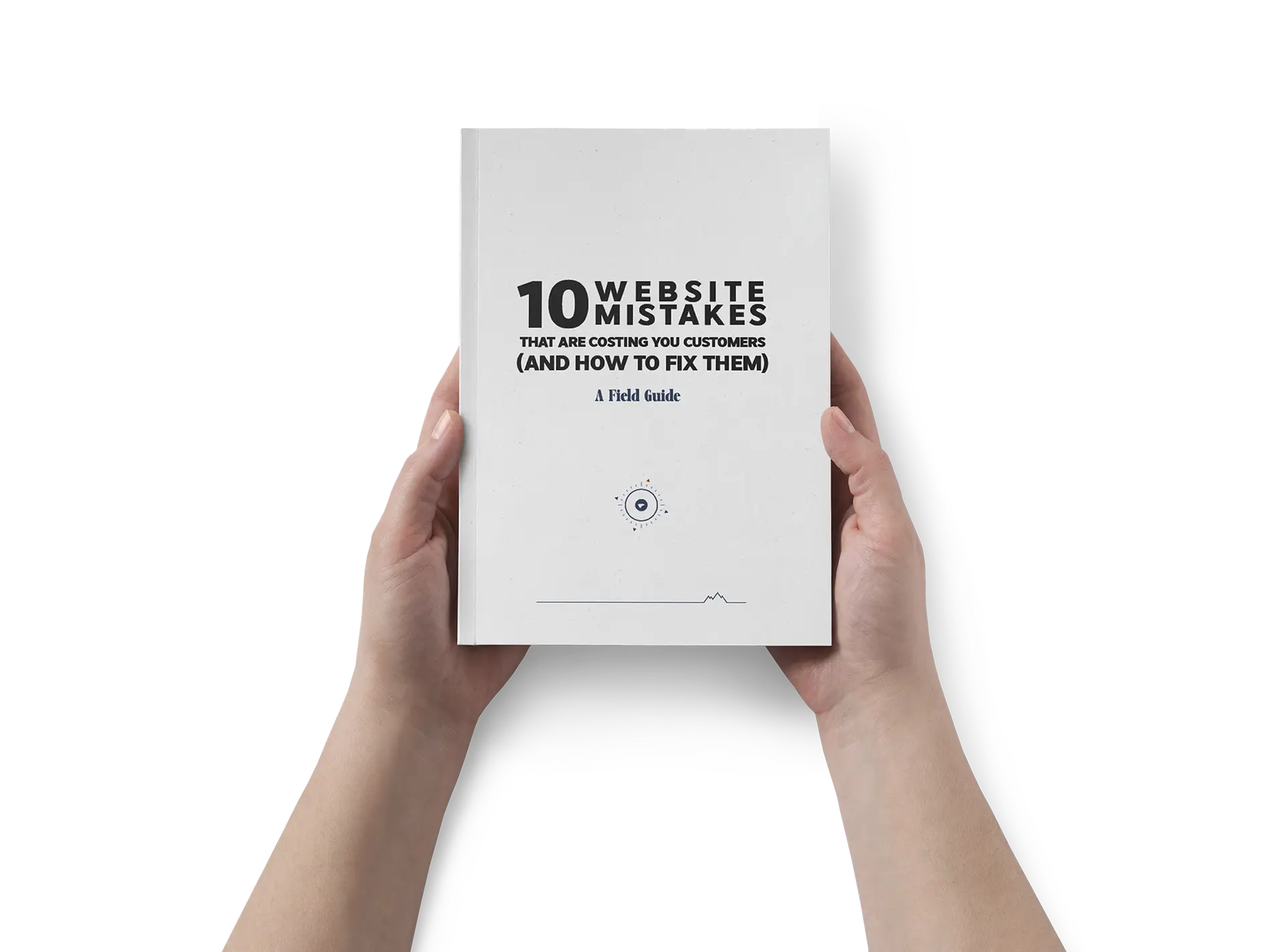View your website as uncharted land filled with possibilities. Good web design acts like a map, guiding customers through all the information.
It lights the way, helping each visitor find what they need. A clear layout removes confusion. It transforms random clicks into useful connections.
In today’s online world, web design is about more than just looks; it’s about making it easy for customers to explore your brand.
What is Web Design in Marketing?

Think of web design in marketing as the trailhead of your digital adventure.
It sets the tone for your customers’ first impressions and helps them navigate your offerings with ease.
A user-friendly site that looks good and reflects your brand acts like a pro guide. It turns visitors into loyal fans.
Quick Tips:
Keep navigation simple and straightforward.
Ensure your visuals match your brand’s vibe.
Keep your messaging clear and concise.
Understanding the Connection Between Web Design and Marketing

Your website is more than just a pretty face – it’s your most powerful marketing tool. Good web design strengthens your brand. It helps each visitor feel welcome.
Take brands like Patagonia or REI, for example. Their websites show adventure and trust. This helps visitors feel confident to explore more.
Good web design builds customer trust, engagement, and loyalty. It does this by offering a consistent look and feel. This aligns well with your marketing strategy.
Is Web Design Part of Digital Marketing?
Absolutely! Web design is the compass that steers your digital marketing campaigns.
A well-designed site amplifies your marketing efforts by enhancing SEO, reducing bounce rates, and increasing customer engagement.
Without thoughtful web design, your digital marketing journey risks getting lost in the woods.
Role of Web Designers in Marketing
Web designers are like seasoned guides, crafting the digital paths visitors follow. They ensure your messaging stays consistent, your visuals compelling, and your brand trustworthy.
Whether creating intuitive navigation or placing clear calls-to-action, designers make sure customers always find their way.
Do Web Designers Need to Know SEO?
Just as explorers need survival skills, web designers need SEO knowledge. Optimizing your website for search engines ensures your brand stays visible in a crowded digital wilderness.
Good design with strong SEO helps your business climb search rankings, making it easier for customers to discover your offerings.
Is Coding Required for Web Designers in Marketing?
Coding skills are like knowing how to set up a sturdy tent—not always required, but incredibly valuable. Understanding the basics of coding helps designers create custom experiences that align perfectly with your marketing goals.
Go Deeper with our Free Guide – Take the First Step Now
Download our free eBook that uncovers common website pitfalls and how to avoid them.
How Web Design Impacts Your Marketing Strategy

Web design plays a crucial role in every stage of the customer journey—from awareness to conversion.
A good design fits well with your marketing strategy. It builds strong connections and offers a consistent user experience. Here’s how:
Building a Strong Brand Identity
Great web design is your campsite fire, attracting customers and giving them warmth and clarity. Using consistent visuals, clear messaging, and easy navigation enhances your brand identity. This builds trust and helps people recognize you.
Apple’s sleek and simple visuals help show off its premium brand.
Enhancing User Experience (UX)
A smooth UX is like a clear, well-marked trail. It ensures visitors stay engaged and satisfied. Easy navigation, mobile responsiveness, and fast load times are key for good UX. They help keep visitors on your site longer.
Supporting Omnichannel Marketing
Your website connects all your channels. It serves as a home for customers who found your brand in other places. A smooth web experience across email, social media, and ads helps customers convert easily.
Web Design and Marketing: Boosting SEO
Your website’s design directly influences your SEO success. Well-structured HTML, mobile optimization, and core web vitals like loading speed significantly impact your ranking.
A site designed with SEO in mind ensures your business remains highly visible online.
Web Design and Marketing: The Importance of Analytics
Analytics act like trail cameras, tracking visitors and their behaviors.
Monitoring your website performance with tools like Google Analytics helps refine your marketing strategy, ensuring your design consistently supports your business goals.
Key analytics to monitor:
Bounce rate
Session duration
Conversion rates
Conversion Rate Optimization (CRO) in Web Design and Marketing
Effective web design doesn’t just guide visitors—it persuades them. Clear calls-to-action, engaging visuals, and straightforward navigation dramatically increase conversion rates.
Think of your website as a trusted friend who gently nudges visitors toward positive actions.
Quick CRO checklist:
Clear, compelling CTAs
Intuitive layout
Fast-loading pages
Types of Web Design that Support Marketing
Responsive Web Design: Adapts smoothly to every device, keeping your brand accessible everywhere.
Adaptive Web Design: Customizes layouts specifically for devices, enhancing user experience.
Static vs. Dynamic Web Design: Choose based on your marketing goals—static for simplicity or dynamic for engagement.
How EV Agency Brings Web Design and Marketing Together

At EV Agency, we blend clarity and creativity using the proven StoryBrand framework developed by Donald Miller.
This approach clarifies your message, ensuring visitors instantly understand your offerings and benefits.
The StoryBrand framework helps your business resonate deeply with customers by structuring your brand’s story clearly and compellingly. Here’s how we use it to boost your website’s success:
1. The Header (Above the Fold) – The Hook
Clear headline addressing the customer’s primary challenge.
Supportive subheadline reinforcing your value proposition.
Prominent CTA guiding immediate action.
2. The Problem – Empathy & Agitation
Clearly acknowledge customer frustrations.
Highlight risks associated with not solving the problem.
Establish your authority and credibility.
3. The Guide – Your Clear Solution
Position your brand as the trusted guide.
Provide a straightforward plan outlining how simple it is to work with you.
4. The Success – Demonstrate Transformation
Include testimonials and case studies demonstrating tangible results.
Clearly illustrate before-and-after scenarios.
5. The Failure – Clarify What’s at Stake
Reiterate the consequences of inaction.
Contrast these risks with the clear benefits of choosing your solution.
6. Final Call to Action
Reinforce your clear and compelling CTA.
Highlight the ease and benefits of taking immediate action.
Go Deeper with our Free Guide – Take the First Step Now
Download our free eBook that uncovers common website pitfalls and how to avoid them.
Final Thoughts: Bringing Web Design and Marketing Together
Great web design isn’t just about aesthetics—it’s about creating an adventure your customers love to experience. By thoughtfully combining web design and marketing, your business can attract, engage, and convert visitors into loyal customers.
The key element is a harmonious balance between user experience, visual appeal, clear brand messaging, responsiveness, and strong SEO practices to effectively attract and convert your target audience.
A web design company creates visually appealing, user-friendly websites to help businesses represent their brand online, attract customers, and support their marketing efforts.
A web designer plans, designs, and creates websites by combining aesthetics, user experience, and functionality. They handle visual layout, graphic elements, navigation, and responsiveness across devices.
- Static Web Design: Simple, fixed content that rarely changes.
- Dynamic Web Design: Interactive, content-managed websites that update regularly (e.g., blogs, e-commerce sites).
- Responsive Web Design: Websites designed to adapt seamlessly across various devices like mobile, tablet, and desktop.
Web marketing, also known as digital marketing or online marketing, refers to strategies promoting products or services through the internet, including SEO, social media marketing, content marketing, email marketing, and PPC advertising.
Web marketing works by utilizing online channels—such as SEO, content marketing, social media, email campaigns, and paid ads—to drive traffic to websites, build brand visibility, attract targeted audiences, and convert visitors into customers.
A website serves both branding and marketing purposes. Branding is reflected in its visuals, messaging, and design, while marketing includes using the website to attract, engage, and convert customers through SEO, content, and advertising.
Yes. A website is a fundamental component of marketing, providing an online platform for promoting products, engaging customers, capturing leads, showcasing services, and building brand visibility.
Web design involves creating visually appealing and functional websites, while SEO (Search Engine Optimization) refers to strategies that improve website visibility in search engine results through techniques like keyword optimization, link building, and enhancing site structure.
Keep Growing • More Dispatches from Basecamp
Struggling to attract clients? Our construction marketing services help contractors, builders, and developers boost leads, increase visibility, and grow revenue.
Discover the essentials of corporate website design, including best practices, top examples, and step-by-step guidance on building a high-performing site.
Learn why website development is crucial for your business. This guide covers everything from choosing a website builder to optimizing for SEO and ensuring long-term success.
Discover the best website builder for small business in 2025. Compare WordPress, Shopify, Wix, Squarespace, and more to find the perfect solution for your needs.
Learn what digital marketing is in simple words. Discover how it connects businesses to online audiences through SEO, social media, and email.
Discover the pros and cons of in-house vs. outsourced social media management. Explore which option is best for your business with insights from EV Agency.









